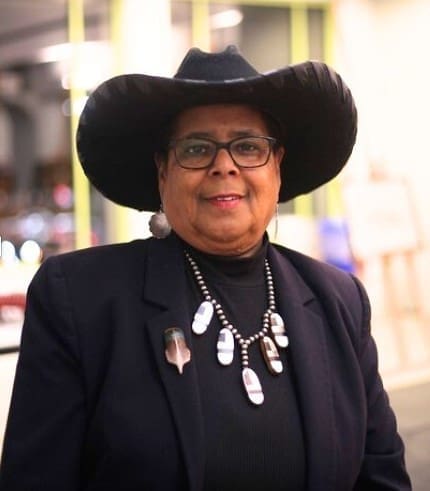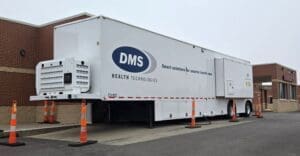By Ron Wilson, director of the Huck Boyd National Institute for Rural Development at Kansas State University
Image: Angela Bates courtesy of Ron Wilson
That is one way of describing the true story of a group of African-Americans who traveled to Kansas seeking new opportunities in the post-Civil War era. Today we’ll meet a woman who is preserving and sharing that history in various ways, including a new documentary film about that journey.
Her name is Angela Bates, and she knows the story well – because those brave travelers were her ancestors.
Bates retired in December 2024 after 38 years as the founding president and executive director of the Nicodemus Historical Society. Nicodemus is a settlement of African-Americans who came to Graham County after the Civil War.
When Angela was four, her parents moved from Nicodemus to California but they came back to Kansas each summer. She even chose to go to college at Emporia State. Bates earned a degree in education and moved to Washington, D.C. and then to Denver before returning to Nicodemus where her parents had retired.
Nicodemus’ history is quite fascinating. Formerly enslaved people from Kentucky were enticed to homestead in the ‘Promised Land’ of Kansas. Bates’ ancestors were among those who first came from Kentucky by train and got off at Ellis. From there, they walked and rode wagons to the townsite of Nicodemus.
Bates helped establish the Nicodemus Historical Society in 1986. The significance of Nicodemus was becoming recognized nationally. It is the oldest and only remaining Black settlement west of the Mississippi River after Reconstruction. Today, Nicodemus is a rural community of 15 people. Now, that’s rural.
Bates’s cousin, Veryl Switzer, the legendary football player and K-State administrator, was also from Nicodemus. In 1976, he led the effort to have Nicodemus designated as a historic landmark by the National Park Service.
Twenty years later, in 1996, Angela Bates led the successful effort to have Nicodemus designated as a National Historic Site. Five historic buildings were included and a Visitors Center was opened.
Bates became very interested in the journey made by the founders of Nicodemus. Through the years, she collected information about the route taken by her ancestors across Ellis County. She started giving tours.
“One day we were processing documents at the museum and we found a letter from a census taker from Chicago who wrote about his trip to Nicodemus,” Bates said. The detailed letter included specific descriptions of geographic locations along the route.
“It solidified everything,” Bates said. She enhanced her tours and then added reenactors.
One bus tour included people from the Sunflower Foundation and the Trust for Public Lands. They encouraged her idea to do a full re-enactment and to capture it on film. With support from the Trust for Public Lands, the Dane G. Hansen Foundation of Logan and others, Bates gathered a crew, developed a script, and produced a film in 2024. It is titled “Ellis Trail to Nicodemus: The End of the Journey to the Promise Land.”
The film includes actual descendants of the first Nicodemus settlers. It depicts those first settlers in Nicodemus, including a young woman named Emma Williams.
Emma is pregnant but her husband stays behind in Kentucky to finish work while she goes west with other family members. When they make the 35-mile overland trip to Nicodemus, they find a town they have to build themselves.
This is a true story. These settlers survived an arduous journey and built homes and a community on the frontier. Emma would then give birth to a boy and then a second son who would become Angela Bates’ grandfather.
“It’s part of the settling of the west and a valuable part of American history,” Bates said. The film has been shown on PBS and at various showings around Kansas. There is interest in a sequel that could include the following spring when Emma’s husband joins her in Nicodemus.
“I’m looking for funding (for the sequel) and I’m also supposed to be writing my memoirs,” Bates said.
For more information, contact nichis@ruraltel.net or www.nicodemushistoricalsociety.org.
We commend Angela Bates, the people of Nicodemus, and all those involved for making a difference with this historical film. At the end, it is a story of triumph.
Audio and text files of Kansas Profiles are available at https://www.huckboydinstitute.org/kansas-profiles. For more information about the Huck Boyd Institute, interested persons can visit http://www.huckboydinstitute.org.













